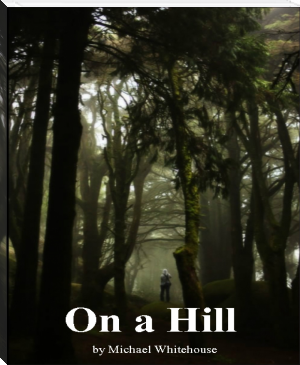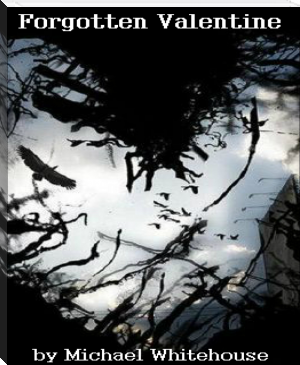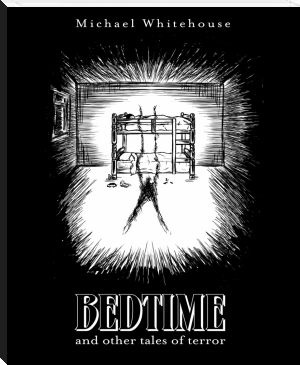On a Hill, Michael Whitehouse [hardest books to read .TXT] 📗

- Author: Michael Whitehouse
Book online «On a Hill, Michael Whitehouse [hardest books to read .TXT] 📗». Author Michael Whitehouse
Taking a deep breath, he crept quietly through the twisted grass, pulling the leaves of a large, low hanging tree to the side. There, sitting on that hillside where locals feared to tread, lay what looked like an old chapel or church. One small steeple reached upward to the sky, with large stain glassed windows - many of which were broken - dotting the shell of the grey stone building, speaking of days more prominent and glad.
John’s heart raced at the sight of it. Perhaps this was the reason why the hill had been tarnished with superstition and myth. An old abandoned church was certainly a fertile foundation for frightening tales. Yet the church itself did not banish his own feelings of caution. As he broke through a layer of leaves, grass, and climbing ivy, he could not help but respond to his nerves. Sweat began to drip down his face while his heart pumped blood with an unsettling, unstable rhythm.
Leaving the hill was still his intention, but as he drew closer to the stone archway which sheltered the church door within it, he surmised that the locals would be more open to his conventional explanation of why people feared the place, if they knew that he had been inside. Without seeing the interior of the church, the villagers could once again spin stories and falsehoods about what remained hidden.
The door was a dark brown oak with scratched decorative metal black strips adorning its surface, but unfortunately it seemed locked. John gave it a few good solid shoves with his hands, and then surprisingly, with a groan of countless years, it creaked open slightly, creating a space just big enough for him to slide through. Peering in through the gap he could see that the church floor was covered in fallen masonry from the roof above. A large collection of stones lay piled up behind the door, their collective weight had held it shut and although they had given way in part, they still provided enough resistance to stop it from opening completely.
Cold, musty air escaped from inside, smelling stale and of stone long since abandoned. For a moment John considered what he should do. Such an old building left to rot for decades, if not centuries, could prove dangerous, but the desire still burned deep within him to prove that he had bravely seen all that could be seen, that there were no ghosts or ghouls there, only fragments of a forgotten history.
Taking out his phone, he poked his hand through the gap in the door and took a few photographs with the flash. The light lit up the entire hall inside, showing it to be filled with rubble from an obviously failing roof, but at the back of the room there lay what appeared to be an altar of some kind. From his vantage point it looked to be made of stone, resting on a raised step, several feet high. Above it, John was thrilled by the presence of an inscription of some kind carved into the back wall, but unfortunately he could not decipher the lettering from the doorway. Sighing, he knew that the only way to read it, would be to go inside. The concern of being injured or trapped by anything falling from above was paramount, but his curiosity was now in full flight, his enthusiasm quelling both the sickness in his stomach and the icy numbing of his extremities.
After once more debating the risks, John decided that he would be as quiet as possible so as to reduce any risk of a cave in. He just had to look. Taking a deep breath, he managed to squeeze through the opening, with a little effort, to the darkness inside. Using a small light on the back of his phone, he was now better situated to survey his surroundings in greater detail. The air was significantly colder, stinging the back of his throat as he inhaled, and though he had expected the interior to be cooler than the outside due to the volume of stone used in the building’s construction, the church in reality felt more like a crypt than any place of worship.
Stepping as carefully as he could, trying not to disturb or dislodge the large piles of rubble on the floor, John kept his eyes trained on the roof overhead, nervous that any loud noise might bring a piece of masonry down on top of him. The extent of the damage now became clear, with the occasional small shard of light penetrating the darkness from a few open wound-like holes above; however, the hall remained surprisingly dim. John found this curious as he felt that the interior around him should have been more visible somehow. It was as if the light was being absorbed by the darkened corners of the hall, but he immediately dismissed this notion as fanciful and cited his escalating imagination as good a reason as any to keep his nerves in check - isolated and unknown environments could cloud even the most rational of minds.
After climbing over two substantial piles of rubble, being careful to avoid several large sharp pieces of broken wood jutting out from underneath, he finally found himself at the rear of the church hall. There lay the altar - a table carved from stone and smoothed by attentive and devoted hands. It was easy to imagine how frightening a priest from the dark ages would have seemed, poised up there spouting fearsome tales from an unenlightened position, foaming at the mouth about damnation and demonic forces preying on the souls of the weak.
A sense of elation and excitement filled John’s mind - to be standing near to something with such a deep sense of history, yet he considered warily the possibility that the altar had been quarried from that very hill, wrenched from a deposit of rock deep in the ground, born of processes far older than humanity itself. But the thrill of such an old and rare discovery quickly extinguished those thoughts. So enamoured by the object was he, that he almost overlooked a small open doorway to the right of the altar which appeared to lead down a flight of stairs to an underground chamber, possibly a vault or tomb. Shivering at the thought of what lay below, he knew that even with his level of scepticism, there would be no venturing down there. Superstition or not, wandering underneath the floor of a clearly decaying building was not a wise idea.
Pointing his phone’s narrow beam of white light to the rear of the hall, it cast a diminutive yet welcome glare over a series of dusty steps which led up to the altar’s platform. A natural arrangement from which a priest or preacher would have delivered their service hundreds of years ago, but yet there felt little that was natural about it or its housing. Again, a creeping unease began to ruminate in his mind as he imagined a fervent and angered holy man standing above all, shouting cryptic and doom-laden parables of ancient origin at a huddled, confused, and frightened congregation.
Making his way onto the platform, eager to study the inscription on the back wall more closely, his attention was unfortunately distracted from the cluttered ground as his foot clipped a broken rock lying on the last step. Stumbling forward abruptly, John’s shoulder slammed painfully against the edge of the stone altar before reaching out a hand to break his fall on the cold, hard platform floor. The noise of his fall echoed throughout the building with the sound ricocheting from wall to roof. For a second he imagined that he heard a fainter sound stirring from elsewhere, close but far. Answering in kind, a small piece of debris plummeted from above, smashing to the ground, teasing and threatening a series of heavier and deadlier replies yet to come. Relief coursed through his body. Glad as he was that the object had not been more substantial in size, and even more so that the stone impacted in front of the small doorway rather than against his head, he was becoming increasingly unsure of his safety.
Regaining a solid footing, he stood up on the platform, holding his shoulder which was now battered and bruised, keeping his eyes trained to the roof nervously. All but for a gentle wind whistling through holes and gaps in the building’s outer shell, silence was omnipotent. Anxious that any other movements might bring the entire ceiling down on top of him, John waited for several minutes before assuming temporary safety from further falling masonry. Then, slowly and more carefully than before, he turned and appraised the altar more closely. Religious iconography dotted its sides along with strange jagged symbols which he did not quite recognise. It was easy to imagine a communion of sorts being given from there, each member of the congregation sombrely approaching - dishevelled and malnourished - receiving a blessing from a stern priest who spoke more of wrath than of love.
John would happily concede to anyone that he was not the most creative or imaginative in nature, but there in that forgotten place he was surprised by how vivid his impressions were. He could almost see those who would have worshipped there - pallid faces sheltering from the bitter cold of winter, bodies withered by the fruitless produce of a poor harvest, yet fear of something extraordinary and undefined suffocating their every thought. Yes, the church was such a decrepit little place that it was easy for the mind to populate it with the ghosts of lamented souls. Of course, he had no way of knowing how correct or inaccurate his assumptions were.
Shirking off the shivers of a wandering mind and laughing to himself for being so easily affected by the place, John’s gaze finally fell upon the inscription carved above, into the back wall. Reaching out he ran his fingers over the dips and rough edges left by the author’s chisel. It was clear that the message on the wall was out of place, rushed as it was with each letter unaligned with those which came before it, suggesting them to be the product of someone hurried - wishing to spend as little time within the church as possible. Standing back, the light from his phone now illuminated the words which came sharply into focus, reading:
Those who dwelt in Dungorth took this hill in 1472. In 1481 we gave it back, in hope that those we disturbed will forgive us our trespasses.
Contemplating the meaning of the inscription, he stood motionless once more, as the fearfully apologetic wording began to gently disturb him. Either the region was one of struggle, having been previously settled by another clan, or perhaps the original inhabitants of the hill shared a preoccupation with myth and superstition with their modern counterparts in the village below.
At first the noise did not filter entirely into his awareness. It was only when repeated with uneven rhythm that his mind recognised its nature. Still facing the inscription, his back turned towards the church hall, the creeping cold sensation he had experienced outside returned sharply to his arms. His body quivered in retaliation to the temperature which had nose dived at an alarming rate, his breath visible in panicked puffs in front of his face. John’s flesh crawled once more with fear as the sound of one foot scuffing a stone floor nearby was slowly followed by another. But who would be in such a place? Not one of the villagers, not with their superstitions and stories of warning and omen about the hillside.
The footsteps felt close, and as his confidence diminished, John’s thoughts now fled simply to escape. As the noise increased in volume, threatening proximity, it was clear that he would have to rush passed whoever stood there to make it to the





Comments (0)